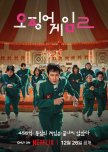
This review may contain spoilers
"A person is born between two people. It's impossible to live alone"
Umi no Hajimari is a drama that asks only one thing from its audience: to pay attention to the struggles of its characters.Those who are young, inexperienced, or simply haven’t developed a strong sense of empathy yet for fictional characters might look at this drama as being black and white. Meaning, they’ll perceive there being good characters and bad characters, but nothing in between. However, those of us who prefer characters and situations that mirror real life will likely have an easier time watching and understanding the complex motivations of each character.
I’ve been following this drama from week to week and noticed the different themes throughout this beautiful story so I'd thought I'd share some of them.
You Can't Do it Alone
Every flashback scene with Mizuki raising Umi highlights the struggles single parents go through. But through all the struggle, all the hardships, there's one key thing that stood out amongst these scenes: Mistsuki wasn't alone. She had a support system. Yes, she was emotionally distant with them, but still had people to lean on.
Flawed Characters Faced With Big Decisions
Mizuki’s Flaw - Fiercely independent, made decisions on the fly without talking to other people, was willing to struggle alone as opposed to asking for help.
Natsu’s Flaw - Indecisive, a follower, doesn’t express his own thoughts and feelings well.
Yayoi’s Flaw - Too agreeable, feels she is not important, doesn’t consider her own thoughts and feelings.
Each of these flawed characters were forced to make tough choices. For Mitsuki, she was torn between telling Natsu about his child or allow him to continue to live his life. For Natsu, his choice was to step up and be a father for Umi or continue to figure out what is the right thing to do. Lastly, Yayoi was confronted with a decision on whether or not she should play an active role in Natsu and Umi’s lives or leave them entirely.
These thoughts and choices all shape how this drama unfolds. Seeing such flawed yet relatable characters navigate around life’s hardest choices adds a realistic element to the story. As an adult and avid drama watcher, these types of portrayals is invaluable. For younger viewers, this should show you that not everything in life is black and white. Every story doesn’t have a hero and villain, but rather regular flawed people trying their best to make ends meet.
Grief - “Everyone’s so nice but suffering too”
Grief plays an integral role throughout this drama.
It weaves itself in and out of almost every dialogue. At times It’s subtle and poignant. Inescapable. Then there are moments where the grief becomes loud and present - demanding your attention. Urging you to understand the great loss the characters are going through.
For Mizuki's parents, the grief was almost unbearable to see play out. It caused them to unfairly criticize Natsu and even invoked anger towards him (At least on the moms part). Even Natsu himself wasn't immune to the effects of grief.
In Episode 8, Natsu has a conversation with his estranged dad. Actually, it was more like a venting session where Natsu spills out things that he bottled up inside, but that’s besides the point. Natsu said something along the lines of everyone is so nice but suffering too. He then mentioned, like he did before, how he feels like it’s not his right to feel sad because everyone was with her for seven years and he wasn’t. He then said that doesn’t change the fact that he’s sad as well.
Natsu was doing the common thing most grieving people do: quantifying sadness. Quantifying sadness, in simplest terms, is when you place an undetermined numerical value or weight to sadness when comparing it with others. It’s like saying he’s competing in the “Pain Olympics” with everyone who were closer to Mizuki than he was.
Grief doesn’t care about the duration of knowing someone. On the surface, it seemed like Natsu was catching up with everyone's grief, but in reality, he was in pain just like those closest to her. There are no levels of grief. Grief just is.
There are more themes but I didn't want to drag this review on longer lol. Overall, Umi no Hajimari will most certainly have a special place in my heart.
Was this review helpful to you?

An okay follow up to a great season 1
Season 2 lacks the historical context/backdrop that made the first season so compelling, but it's still worth checking out for the leads...I guess.In season 1, the characters all had to contend with numerous external and internal conflicts that tested them mentally and morally. It was both inspiring and heartbreaking to see play out each episode. There was a certain emotional depth that made the stakes real.
This time around, we shift the focus to present day where old horrors remerge to give our leads a hard time. The horror element is still there which is great news for those who loved seeing grotesque monsters and intense gore. The action is turned up a notch as well. But again, the emotional depth isn't all there considering a majority of the cast from season 1 is obviously not present. Sigh, I miss those interactions.
This isn't to say season 2 isn't worth watching. As I stated in the beginning, watch if nothing else but for the always stellar performances by the leads. Park Seo Joon and Han So Hee practically carry this drama on their backs. Performances of other cast members were ok. They did their jobs. No complaints here. But the leads? Honestly seeing them together made the story tolerable due to the fact there's a history between them.
Overall, this season seems like its own thing. Yes there are flashbacks spread out here and there, but it feels stand-aloneish. So yeah, watch it for the reasons I've mentioned above, but keep your expectations low if you're expecting a similar emotional thrill ride like season 1.
Was this review helpful to you?

Let's just call it what it is: Squid Game Season 2 Part 1
If I could sum up my initial thoughts of Squid Game season two, it would be this: characters I didn’t really care for, but the actors in those roles put on good performances. A storyline that highlights the dangers of tribalism along with rehashing themes from the first. Lastly, pacing that was always gonna make a lot of people feel dissatisfied because of how Netflix structures their seasons.Like the first season, season two has some pretty solid social commentary on inequality, the wealth gap and how desperation for money creates monsters. However, unlike season one, I personally didn’t care or sympathize for the characters and their desperate attempts to pay off debts this time around.
In season two, we, as an audience, are thrust into a world where many of the main characters are already at the stage of being monsters. This is different from season 1 where we witness a handful of “well-meaning” folks slowly lose their morals as the game progresses. Starting out with more irremediably horrible people than good yet desperate people doesn’t necessarily make for good entertainment. Especially considering, the characters as a whole, are forgettable.
But the actors though? Great performances as to be expected. But sadly again, good performances don't equal memorable characters in this case.
Storyline wise, it hits all the familiar beats of season one but without soul. I mean, the social and economical commentary is clear, but each episode lacks the proper intensity and dread that comes with seeing people you’re rooting for get violently get yeeted out of existence. Many parts felt hollow because significant time was spent on annoying characters than others with potentially interesting storylines.
As for pacing, I feel like this season is a good case study on how money and overall external pressure can influence creative decisions/direction.
I think you could make a strong argument that S2 wasn’t necessary and I wouldn’t disagree. I mean, factually speaking, S2 was never gonna be a thing, at least not this soon, but typical corporate practices aka the Netflix and all streaming platform model made it a reality. Also, S2 was gonna be longer instead of separated between S2 and S3, but again, streaming platforms being streaming platforms.
The writer, Hwang Dong-hyuk was more than willing to accept the boat loads of cash to make a follow up and all I can say to that is “get your money, sir!” Seriously. This man lost nine teeth during the stressful process of creating S1. And to add insult to injury, he didn’t even get paid a lot at the time. Writers being overworked, underpaid and underappreciated is nothing new in the business, so I’m glad he was finally able to get the proper compensation for his hard work, albeit, years later for a second season that wasn’t planned for.
BUT I still feel like the writer was creatively taxed and limited in his vision this time by having to stick to a short season when he intended on having one longish length follow up and conclusion all in one. With that said, it was hard for me to rate this as it was intentionally incomplete.
Anyway, I’m not saying it was a bad follow up, but I’m not saying it was good either. To me, it was okay. Just, okay. The potential was there for it to be good. Obviously not to the level of the first, but it definitely could have kept my attention longer by changing things up and making things more interesting.
Was this review helpful to you?

CRASH *Screams in heavy metal*
Crash really captured what I love about team-based crime thrillers. It has a few similarities with dramas like Taxi Driver and the recent hit Flex X Cop: well -written and directed action scenes, lovable good guys that you can't help but to root for, insidious, vile, pos villains that make you pray for their downfall every time they show up on screen and heart-wrenching "crash of the week" episodes that incorporate a few elements from real life cases.So basically, this action thriller has the same formula that made the dramas I mentioned successful. If you found yourself completely invested in Taxi Driver and others like it, then you'll likely feel the same with Crash. Seriously it's that good.
I guess it's safe to assume that there will be a season 2. No spoilers but the ending was left wide open. I don't usually like to make assumptions with these kind of things but the success of the dramas I've mentioned above seem to indicate that as long as the ratings are high and there's there's plenty of stories left to tell, there's a strong possibility the drama will be getting multiple seasons. Fingers crossed!
Was this review helpful to you?

This review may contain spoilers
A stellar cast comes together to deliver a flawed message
Before I get into what I loved about Part 2, I wanna touch on my overall main issue with this otherwise good drama. So getting right into it, I never expected this drama to move the needle as far as addressing the societal problems SK has that leads many to commit suicide. However, I also didn't expect the overall message to lean towards blaming the victim for doing such a "selfish" misdeed either.
Continuing from Part 1, the theme has been pretty consistent in wrapping things up in Part 2: the ML is so preoccupied with his own troubles that he didn't stop to take a look at the suffering of those around him. It is this misstep that has led him to do the very selfish act of taking his own life in the first place. After all, it's his fault for not continuing to endure his suffering for the sake of his loved ones like the rest of us. Hahaha loser. Of course I stated that in jest, but that isn't far off from what was depicted.
Let's make this clear: the ML is pretty selfish (but not for THAT reason) and has taken life for granted. However, these character flaws shouldn't have been the crutch of why he took his own life. Furthermore, he shouldn't have received punishment because of this. He couldn't see the struggles of those around him because he too was suffering. This doesn't invalidate his suffering, though. This isn't some Christmas Carol Scrooge-like situation where a nasty mean old man gets confronted with his misdeeds and is forced to change his ways or meet a grim fate. We feel empathy for the ML because he is a good person who has a hard life. Those of us who have been in the trenches of depression and suicidal thoughts know what it's like to struggle to hold on. It's not his fault for giving up.
The ML has worked hard for years only to not see the fruits of his labor because society continued to beat him while he was down. Not only that, but once he took his life, he met death who damn near guilt tripped him to hell (literally). Why? Because he's selfish. He treated "meeting death before death comes to meet him "as no big deal. He should've lived and continue to take what life throws at him. It's a good concept on paper, but in action it fails to see suicide from a broader perspective. This is not quite the message someone who has worked hard but still struggled for many years would want to hear and sadly there isn't enough positive thinking in the world that can solve deep rooted issues that society has caused. Don't get me wrong, I see the intent behind depicting the ML go through so much when he was alive, but to enter into the body of someone who got "thrown away" by his family and society (The 11th life where the salaryman loses his job he gave his youth to and his family), only to have the message remain "don't be selfish you loser! Think of your loved ones!" is hard to understand.
So, the few surface level criticisms on the pressures society place on its citizens were nice, but it never attempted to scratch beneath that layer of comfortability to get to the real uncomfortable conversations about why folks consider suicide in the first place. Of course no one's gonna call out or point the finger at the culprits and again, wasn't expecting them to. But to outright pull the victim blaming card was...a choice. There were better options to convey the point but I get the writer wanted to play it safe by doing what is considered a less controversial/ narrower depiction of suicide.
All of that out the way, I still love this drama. I'm not so jaded by life's many struggles not to enjoy every piece of content that misses the mark on depicting sensitive subject matters. The acting and cinematography were top notch. And the music, while not highlighted in every episode, was pretty good as well. Overall, there's enough to love about this drama that'll keep you tuned in. Twists and turns leading up to the finale should keep most satisfied.
Was this review helpful to you?

This review may contain spoilers
Perception vs Objective Reality
Regeneration is a drama with a lot of ambiguity and deception behind every episode. What started as a common tale of revenge against a scammer, slowly but surely turned into a drama about perception. Much like piecing together a puzzle (as the opening alludes to), you don't get a clear understanding of the events that unfolded until the last few episodes. Heck, I'd even argue there are many things intentionally left unclear by the time you reach the end.The stage was set. You have a funeral for the charming and smart scam artist Fei Ke and the attendees: all his victims. Each character shares their story of how they met Fei Ke with each story being sadder than the last. Several plot twists later and the plot becomes less straightforward than originally believed.
Without giving too much away, it turns out, everybody is terrible. This main reveal is what made this drama compelling to watch. To steal a line from the ml "there are no good or bad lies. It's all just a lie." This is the driving force behind the drama: the many lies from unreliable narrators.
Every character blamed Fei Ke for their misfortunes. At first glance, their anger would seem justified. Fei Ke did scam them, after all. But as the "truth" gets revealed, it becomes clear every characters downfall was orchestrated by their own hands. They all approached Fei Ke instead of the other way around. They all were deceptive and used Fei Ke as a means to avoid taking responsibility for their own terrible actions.
I almost made Fei Ke sound like a victim here. To be clear, he wasn't exempt from the same flaws the other characters faced. His whole life took a turn for the worst when he got caught doing something illegal. And instead of taking responsibility and being more angry at his careless actions, he blamed his friend for ratting him out.
If this all doesn't sound exciting to you then that's completely understandable. Regeneration isn't the smartest cdrama ever crafted, but it's one that really makes you think until the very end. It poses some interesting questions about what is the truth and what is a lie. In the end, we don't really get an answer to many of the questions as the director wanted to focus on perception and not objective reality.
Was this review helpful to you?

This review may contain spoilers
A quirky tale of destiny and self-acceptance
It's too early for me to say 'The Atypical Family' is the drama of the year, but let me just say it's definitely a contender!Full transparency as someone who watches well over a dozen dramas per month: I thought about possibly holding off on watching this drama until it aired all the episodes. I wasn't really sold on the premise after the second episode and some of the characters kind of annoyed me.
So fast forward to now (writing this review on June 9th finale day) and I'm so glad I didn't listen to that tiny voice in my head telling me to drop it faster than other dramas! So what got me to change my mind so quickly? Well firstly, it's the cinematography that kept me seated. Then came the story. Next was the performances. Last was the music.
What I like to do with reviews is give you a spoiler-lite breakdown of things to look for, standout moments and or performances and just simple reasons to give this drama a chance (or drop it if it doesn't sound worth your time):
Is there romance? Oh yes! It takes a little to while to get things started but once you get to around episode 6ish, you'll likely be all-in for the leads to get together!
Is the story good? Yes. An absolute masterpiece? Maybe for some. For me, it was pretty good. I was kind of impressed that in just 12 episodes there was enough to keep me looking forward to watching week after week. The A plot revolves around time travel and romance. The B plot follows each character as they come to terms with their powers and the wild antics of the con artist family. Both plots seamlessly intertwine from the first episode to the last. As far as pacing is concerned, I'd say things might feel rushed on episode 12. They had to wrap up all the loose threads in the roughly 1 hour episode so it's natural to feel things happened too fast. Thankfully there weren't many loose threads.
How were the performances? In short: flawless. Every actor put on a stellar performance. My personal favorites were Jang Ki Yong as Bok Gwi Ju, Chun Woo-hee as Do Da Hae and Park So Yi as Bok I Na. If you're like me and can't really remember a memorable role of actor Jang Ki Yong, then he'll definitely be memorable in this drama! Man, something about him crying makes you breakdown and cry too. He put so much emotion into the role. Same with the talented Chun Woo-hee. She nails her role as a con artist looking to escape her horrible life. Lastly, 12 year-old Park So Yi will win you over from the very first scene she's in. She's so talented!
Other things to note:
There's a "sudden" shift in personality for the big bad of the story that might confuse you. You can chalk this up to the character not getting enough screen time or rather the writer not delving into the motivations behind the character. If this drama was 16 episodes the characters turn to the side of light might not be so jarring. With that said, them not being fleshed out doesn't take away from their great performance.
There are plenty of "girl power" moments if you love seeing women treating a terrible character like the trash that he is.
The soundtrack grows on you!
Kim Su Hyun in a fat suit was a choice. I wasn't liking it at first but the characters journey to self-acceptance made me forget about it.
If you're patient enough (something I initially lacked in the beginning) to hop on this emotional ride, I promise you won't regret it! Who knows, by the end of it, you might turn into an emotional mess like me!
Was this review helpful to you?

This review may contain spoilers
A short and literally dark action-packed drama with little substance
There is not much I can say about The Tyrant.It's bloody, gory, super dark (literally), but doesn't provide much in the way of an interesting plot. That's perfectly fine if you're like me and watched this just to see the returning Kim Seon Ho. Other than that, this 4 episode long drama was ok...at least from the parts I saw of it.
This might sound like I'm overexaggerating, but I struggled to actually see what the heck was going on.
I don't know if the entire lighting department decided to go on vacation during the filming of this drama, or the director intentionally wanted the cinematography to be dark. Whatever the reason, I struggled to make out what was happening. I guess it worked out though because really, there was nothing of worth that occurred in all 4 eps. There was nothing but action, some minor character motivations, and more action.
Do you have to watch The Witch Part 1 and Part 2 in order to understand what's happening in this?
Short answer: no. Long answer: You won't find any obvious signs of this drama fitting into The Witch universe. You can jump right into it without knowing what's going on.
There is one possibly returning character from The Witch Part 2: The Other One. I stress "possibly" here because I may be mistaken. The actor from the sequel, Justin Harvey, has a non-speaking role in this drama. Acting credits just call him Crocodile #1 so I don't know if Justin reprises his character, Tom, from Part 2 but under a different name or if he's playing an entirely different character. It's clear I gave this more thought than others. Don't judge me.
The drama follows closely to the theme of both Witch movies - South Korea experimenting on folks to try to create a super solider. By the end, SK will be three for three on creating, whether intentional or not, super powerful and uncontrollable women who leave a trail of bodies in their wake. Somewhere down the line, preferably in a movie, I want to see all three women in one movie (The Witch Part 3 hopefully). I mean, that's where it seems like things are headed anyway.
All in all, The Tyrant was ok. Basic, easy to follow plot with tons of action and gore.
Was this review helpful to you?

This review may contain spoilers
We all need a sweet home to return to
If you didn't like season 2's shift of focus from the survivors we've grown to love to a whole new group of survivors in a new setting, you might be thinking season 3 won't have much to offer you.Yes, the season 2 characters are still around, but the core 5 from season 1 (Cha Hyeon Su, Pyeon Sang Uk, Lee Eun Hyeok, Seo I Kyeong and Lee Eun Yu) are back in the spotlight for this final gory monster filled outing.
So let's start with the good: Lee Do Hyun is back after being absent for practically all of the second season. That appearance at the end of season 2 and the long wait for this season had me anticipating the brother and sister reunion between his character Lee Eun Hyeok and Go Min Si's character Lee Eun Yu.
Did it live up to the hype and delusions I singlehandedly built up by myself? Well, it wasn't bad. I kind of wish we got more interactions out of their characters but I can see why they wanted to wrap things up quickly.
Speaking of interactions: Cha Hyeon Su played by Song Kang has more of a prominent role this season. Despite being THE star of the drama, he was noticeably absent from most of season 2. I mean, sure, he was around, but with the introduction of new characters, he story arc felt like a side quest instead of the main story. I personally couldn't care less about his character if it meant he wouldn't be interacting with the complete cast of survivors (those who didn't die, of course) from season 1.
Anyway, the narrative once again focuses on Cha Hyeon Su's internal conflict and battle with his alter-ego. I couldn't been happier not as a Song Kang fan but as a fan of consistent storytelling. Really, the bar was so low this season. At the very least, I wanted the writers to follow through with plotlines and story threads that they introduced in the first season. I'm easy to please, dammit!
Rambling on with the good comes the acting. It wasn't a stellar story overall, but everyone's acting was great. You really felt the emotions from the characters. Kudos for all of those involved who took an "ok" script and made it slightly above average just with their acting.
That brings me to the bad: The story. While I praise the acting, the story felt rushed and boring at some parts. Around episode 5 is where I felt the pace picked up. I know it's an 8 episode drama, but I feel like the buildup was there for a good sendoff, but the writers kind of fumbled it by speed running to the end and throwing in lots of deaths that lacked emotion.
Also, there were story arcs that I didn't care about along with characters that, while entertaining, added no value to the overall narrative. I've had similar thoughts in season 2, but I was generally still seated because I knew (hoped) this season would be a return to what I loved about the drama in the first place: a great emotionally driven story.
The thing that confused me the most was the lack of attention on the new species called Neohuman's. Season 2's ending had me hype to see what would happen with their inclusion in the overall story. Were these Neohuman's gonna be on the side of good, bad or a neutral party? How were our characters gonna deal with this new possible threat in a world already full of other threaty-threats?
Well, we don't really get an answer to those questions exactly. Instead, the Neohuman's just seemed like a convenient excuse to cut down on the budget, but hey, I don't blame them though! Those CGI trash monster/transformer hybrids from last season were ridiculous and borderline offensive.
I'm closing this review with something positive. The ending was pretty good. Not great, but good. It actually made me emotional. Even with the flaws and narrative missteps that plagued this season, it was still bittersweet to see things come full circle and the three main characters we've followed the journeys of since season one return home.
Was this review helpful to you?

"The color of love provides the meaning of life and art"
Drawing Closer is the latest tearjerker from writer Tomoko Yoshida whose works include Love Like the Falling Petals, I Want to Eat Your Pancreas and Tomorrow I Will Date Yesterday's You.If you've watched those excellent movies before, you'll likely feel the same way about this as you did with them. Consider this your warning to have lots of tissues around before you dive in. This movie will absolutely wreck you with it's emotional portrayal of resilience and living in the moment.
Was this review helpful to you?

 1
1

